Historic WIPO treaty adopted on intellectual property and genetic resources with strong support from countries in Africa

In a landmark achievement for international intellectual property law, the WIPO treaty on intellectual property, genetic resources, and associated traditional knowledge was adopted by consensus on 27th May. This milestone underscores the vitality of multilateralism in the field of IP.
Mauritania: BCI and EIB partner up to fund SMEs, with EU support

Just three months after signing a financing arrangement with the EIB, the BCI has already granted MRU 280 million (€6.5 million) in loans to five SMEs to support employment, entrepreneurship and access to finance for Mauritania’s women and youth.
Ambitious EU–Kenya Economic Partnership Agreement enters into force

On 1st July, the EU-Kenya Economic Partnership Agreement (EPA) has entered into force, representing a key milestone in the EU-Kenya Strategic Partnership.
EBCAM attends the 2nd Meeting of the European Commission Expert Group on Enhanced Coordination of External Financial Tools on 28 May 2024

EBCAM attends the 2nd Meeting of the European Commission
Expert Group on Enhanced Coordination of External Financial Tools
28 May 2024, Brussels
On 28 May, the European Business Council for Africa attended in person the 2nd Meeting of the European Commission Expert Group on Enhanced Coordination of External Financial Tools, an initiative of DG INTPA and DG TRADE to bring together the Export Credit Agencies (ECAs) and the Development Finance Institutions (DFIs) to contribute to the development of emerging markets by enhancing investments and trade.
The European Commission launches new migration partnership with Mauritania

On May 7, 2024, the European Union is strengthening the cooperation between EU and Mauritania by launching a migration partnership and dialogue. Commissioner for Home Affairs, Ylva Johansson together with the Mauritanian Minister of Interior and Decentralisation, Mohamed Ahmed Ould Mohamed Lemine, have signed a Joint Declaration launching an EU-Mauritania migration partnership.
EU-Kenya: Council takes final step to allow the implementation of the Economic Partnership Agreement

The Council adopted on May 30, 2024, a decision on the conclusion of the EU-Kenya Economic Partnership Agreement (EPA). This will boost trade in goods and create new economic opportunities, with targeted cooperation to enhance Kenya's economic development.
BEI Monde : signature d’un contrat de financement de 20 M€ avec la BCI pour soutenir les entreprises mauritaniennes.

Suite à la visite ce jour de la Présidente de la Commission européenne Ursula von der Leyen en Mauritanie, durant laquelle elle a salué un renforcement du partenariat UE-Mauritanie, M. Isselmou Ould Tajidine, Président de la Banque pour le Commerce et l’Industrie (BCI) et M. Markus Berndt, Directeur exécutif de la BEI Monde, la nouvelle branche de la BEI dédiée au développement de la BEI, ont signé un contrat de financement d’un montant de 20 millions d’euros en présence de la Commission européenne, avec la possibilité d’une tranche additionnelle de 5 millions d’euros. L’objectif de ce nouveau financement est de renforcer le soutien aux Petites et Moyennes Entreprises (PME) et aux Entreprises de Taille Intermédiaire (ETI) de Mauritanie avec le concours du Fonds européen de développement durable plus (EFSD+). Une attention particulière sera portée aux jeunes et aux femmes en termes d’entreprenariat et d’accès au financement, de formation et d’emploi.
Mozambique: Council extends the mandate of the EU training mission until 2026 and paves the way for its evolution into a EU Military Assistance Mission

The Council today prolonged the mandate of the EU Training Mission in Mozambique, until 30 June 2026, with a budget allocation of over €14 million for this period.
Furthermore, the Council decided to adapt the strategic objectives of the mission to new circumstances, thereby favouring its transition from a training to an assistance model, combining advising, mentoring and specialised training in support of the units of the Quick Reaction Force (QRF) of the Mozambican armed forces.
Corporate sustainability due diligence: Council gives its final approval

The Council has formally adopted the corporate sustainability due diligence directive on May 24, 2024. This is the last step in the decision-making procedure.
The directive adopted today introduces obligations for large companies regarding adverse impacts of their activities on human rights and environmental protection. It also lays down the liabilities linked to these obligations. The rules concern not only the companies’ operations, but also the activities of their subsidiaries, and those of their business partners along the companies’ chain of activities.
Commission reports on thirteenth negotiation round with five Eastern and Southern African countries to deepen existing EPA

The European Commission has published a report summarising progress made during the latest negotiation round to deepen the existing Economic Partnership Agreement (EPA) with five Eastern and Southern African partners.




